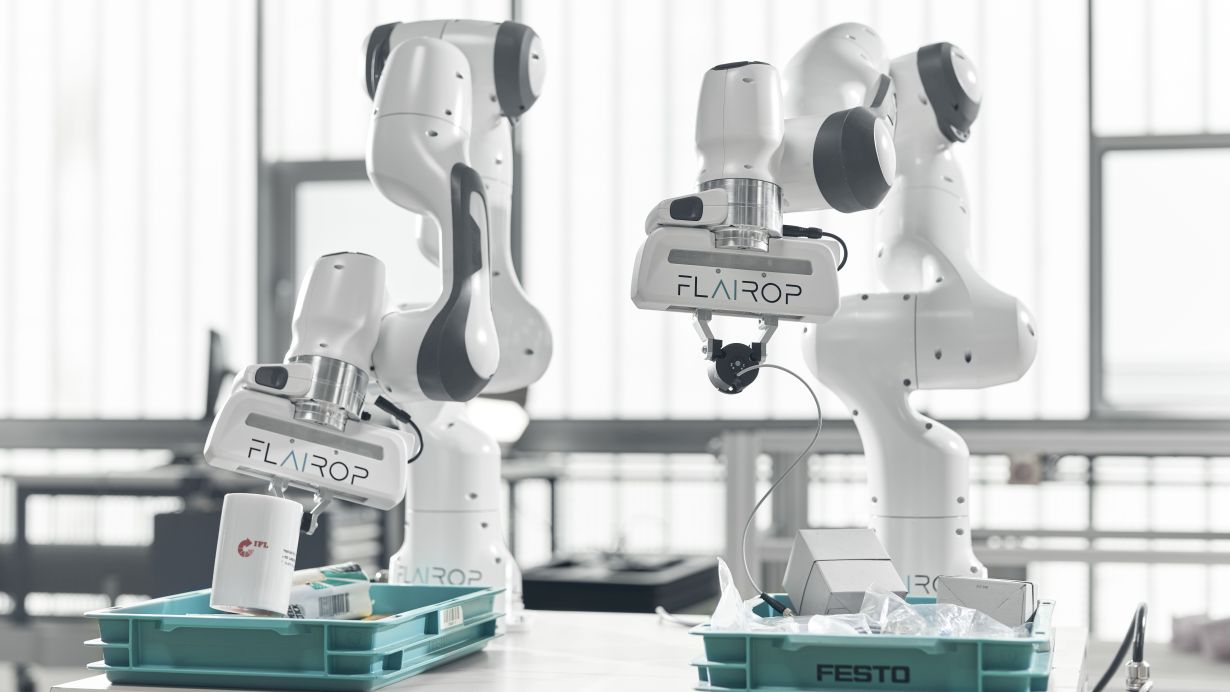Autonomous robots that can be deployed flexibly are considered the key to Industry and Logistics 4.0. The problem: Training of robots driven by artificial intelligence (AI) requires very large data volumes which are available to few companies only. The solution: Robots of different companies at different locations learn from each other. Researchers of Karlsruhe Institute of Technology (KIT) and partners have now developed federated learning methods without sensitive data and company secrets having to be shared.
“When using conventional machine learning methods, all data are collected and the AI is trained on a central server,” says Maximilian Gilles from KIT’s Institute for Materials Handling and Logistics (IFL). Joint, but locally separate learning, also referred to as federated learning, enables use of training data from several stations, factories, or even companies without the parties having to share sensitive data. “This is how we trained autonomous picking robots to reliably pick articles they have never seen before,” Gilles adds. Due to the variety of objects stored in a warehouse, this is a very challenging task, he points out.
Training without Central Data Collection
In 2021, the research project FLAIROP was launched for this purpose. Training took place without any exchange of data, such as images or grasping points. Instead, local parameters of the neural networks, i.e. highly abstracted data, were transmitted to a central server. There, the distributed models of all stations were aggregated with the help of algorithms. Then, the improved version was returned to the local stations and training was continued with local data. This process was repeated several times. “Our results prove that federated learning produces collaborative robust AI solutions for use in logistics without having to share sensitive data,” says Sascha Rank from KIT’s Institute of Applied Informatics and Formal Description Methods (AIFB), another partner of the project that was completed recently.
In future, the federated learning system will be further developed for the platform to enable different companies to train robot systems together without having to share data. Maximilian Gilles and his team are looking for partners from industry and research to continue their work.
For training the robots, a total of five autonomous picking stations were set up: Two at IFL and three at Festo SE based in Esslingen am Neckar. “We are proud that we have succeeded in showing that robots can learn from each other without sharing sensitive data and company secrets. This protects our customers’ data and we also gain speed because the robots can take over many tasks faster this way. For example, the collaborative robots can help production workers execute repetitive, heavy, and tiring tasks,” says Jan Seyler, Head of Advanced Development Analytics and Control of Festo.
The FLAIROP Research Project
The FLAIROP (stands for Federated Learning for Robot Picking) project was a collaboration of Canadian and German organizations and companies. While Canadian project partners concentrated on object recognition by deep learning, explainable AI, and optimization, German partners contributed their expertise in robotics, autonomous grasping by deep learning, and data security.
The partners and their shares:
KIT-IFL: Development of an algorithm for the determination of grasping points, development of automatic learning data generation
KIT-AIFB: Development of the federated learning framework
Festo SE & Co. KG: Consortium leader, development of picking stations, piloting
University of Waterloo (Canada): Development of object recognition algorithm
Darwin AI (Canada): Local and global network optimization
FLAIROP was funded by the Canadian National Research Council (NRC) and the German Federal Ministry for Economic Affairs and Climate Action (BMWK). KIT received a share of about EUR 750,000.
In close partnership with society, KIT develops solutions for urgent challenges – from climate change, energy transition and sustainable use of natural resources to artificial intelligence, sovereignty and an aging population. As The University in the Helmholtz Association, KIT unites scientific excellence from insight to application-driven research under one roof – and is thus in a unique position to drive this transformation. As a University of Excellence, KIT offers its more than 10,000 employees and 22,800 students outstanding opportunities to shape a sustainable and resilient future. KIT – Science for Impact.

